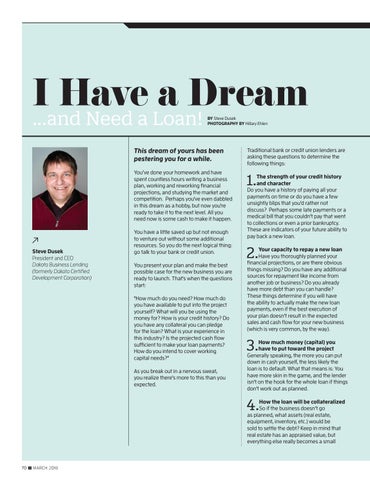I Have a Dream ...and Need a Loan!
Steve Dusek President and CEO Dakota Business Lending (formerly Dakota Certified Development Corporation)
BY Steve Dusek PHOTOGRAPHY BY Hillary Ehlen
This dream of yours has been pestering you for a while.
Traditional bank or credit union lenders are asking these questions to determine the following things:
You’ve done your homework and have spent countless hours writing a business plan, working and reworking financial projections, and studying the market and competition. Perhaps you've even dabbled in this dream as a hobby, but now you're ready to take it to the next level. All you need now is some cash to make it happen.
1.
You have a little saved up but not enough to venture out without some additional resources. So you do the next logical thing: go talk to your bank or credit union. You present your plan and make the best possible case for the new business you are ready to launch. That's when the questions start: "How much do you need? How much do you have available to put into the project yourself? What will you be using the money for? How is your credit history? Do you have any collateral you can pledge for the loan? What is your experience in this industry? Is the projected cash flow sufficient to make your loan payments? How do you intend to cover working capital needs?" As you break out in a nervous sweat, you realize there's more to this than you expected.
The strength of your credit history and character Do you have a history of paying all your payments on time or do you have a few unsightly blips that you’d rather not discuss? Perhaps some late payments or a medical bill that you couldn’t pay that went to collections or even a prior bankruptcy. These are indicators of your future ability to pay back a new loan.
2.
Your capacity to repay a new loan Have you thoroughly planned your financial projections, or are there obvious things missing? Do you have any additional sources for repayment like income from another job or business? Do you already have more debt than you can handle? These things determine if you will have the ability to actually make the new loan payments, even if the best execution of your plan doesn’t result in the expected sales and cash flow for your new business (which is very common, by the way).
3.
How much money (capital) you have to put toward the project Generally speaking, the more you can put down in cash yourself, the less likely the loan is to default. What that means is: You have more skin in the game, and the lender isn’t on the hook for the whole loan if things don’t work out as planned.
4.
How the loan will be collateralized So if the business doesn’t go as planned, what assets (real estate, equipment, inventory, etc.) would be sold to settle the debt? Keep in mind that real estate has an appraised value, but everything else really becomes a small
70
MARCH 2018
